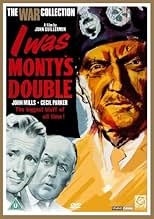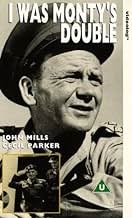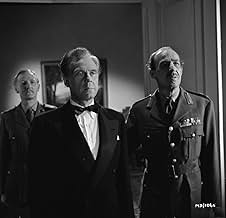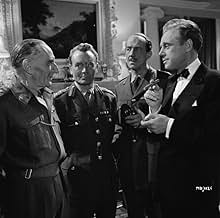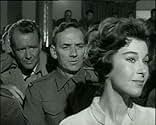VALUTAZIONE IMDb
6,9/10
1763
LA TUA VALUTAZIONE
Aggiungi una trama nella tua linguaDuring World War II, a British actor impersonates Field Marshal Montgomery in order to confuse German intelligence.During World War II, a British actor impersonates Field Marshal Montgomery in order to confuse German intelligence.During World War II, a British actor impersonates Field Marshal Montgomery in order to confuse German intelligence.
- Regia
- Sceneggiatura
- Star
- Premi
- 1 candidatura in totale
M.E. Clifton James
- M.E. Clifton James
- (as M. E. Clifton James)
- …
Kenneth J. Warren
- F
- (as Kenneth Warren)
- …
Recensioni in evidenza
Exactly the sort of film they don't make any more. A fun tale of low-key derring-do. The always excellent John Mills is the main draw, but there are also fabulous turns from some of the best known British character players of the mid-20th Century. Overall, the film makes for perfect lazy Sunday afternoon viewing.
At the fag-end of the 50's, a generation of long-demobbed soldiers were still trying to cut it in uniform, in a spate of cheap black-and-white war films. More convincing than most was the unknown star of this true story, a minor Australian actor who had been rejected by the entertainment services, and was reluctantly pen-pushing in the pay office, when someone noticed that he was a dead ringer for Montgomery.
This was in the run-up to D-Day, when the allies were desperate to draw enemy attention away from Normandy as the obvious invasion zone. Might a Monty-lookalike be able to fool German intelligence by touring North Africa, as though preparing for a big Mediterranean landing instead?
The actor in question, M.E. Clifton James, is secretly employed as a driver on Monty's staff, in order to get close enough to study his speech and mannerisms. But he doubts his own ability to replicate the character and personality of the great man, not least because 'Jimmy' is a chain-smoking alcoholic. Eventually, jolly optimist John Mills persuades him to go through with it, and suddenly he's stepping off a plane in Gibraltar, under scrutiny from enemy agents (one of them brilliantly sinister, as played by Marius Goring), as well as certain officers who remember Monty from before the war.
Defying many attempts on his life, Jimmy overcomes his desperate shyness, and learns to take massed salutes from whole armies. Then all too soon, D-Day has come and gone, his one brief star-performance is over, and it's back to the humble pay office. Except... they felt it necessary to bolt-on a false ending, about which we can reveal nothing, except that it never happened.
As for the real-life outcome, we have to face the disappointing fact that it was only part of a much larger decoy operation, which did throw the enemy into some confusion, but reports of Jimmy's own effort reaching Hitler's desk seem to be wishful thinking.
The film displays some recognisable weaknesses of those low-budget productions. The over-long opening section is taken up with John Mills' various flirtations, whose only consequence for the story is that his humourless boss (Cecil Parker) decides to replace their seductive secretary with the ugly-beautiful Barbara Hicks, in some ways more arresting. And the way Mills and Parker chat freely in public about top secret plans will grate on the ear of anyone who has worked in intelligence. No war-film of its day was complete without the stuffed-shirt spoilsport Allan Cuthbertson, who duly pops-up here, as does the perennial plug-ugly sergeant Anthony Sagar. Jimmy's one meeting with Monty is awkwardly dodged; we simply cut away from him on the steps of the general's caravan, although split-screen techniques had long since enabled an actor to shake hands with his own double (try the 1937 'Prisoner of Zenda').
None of this really detracts from the joy of the film, principally the deeply-believable performance of a professional actor, acting himself acting Monty. Sympathy and charm shine through this modest man, who seems to have been shabbily treated after the war, when he was reduced to the dole. Hopefully this popular film brought a little benison for the five short years that remained to him.
This was in the run-up to D-Day, when the allies were desperate to draw enemy attention away from Normandy as the obvious invasion zone. Might a Monty-lookalike be able to fool German intelligence by touring North Africa, as though preparing for a big Mediterranean landing instead?
The actor in question, M.E. Clifton James, is secretly employed as a driver on Monty's staff, in order to get close enough to study his speech and mannerisms. But he doubts his own ability to replicate the character and personality of the great man, not least because 'Jimmy' is a chain-smoking alcoholic. Eventually, jolly optimist John Mills persuades him to go through with it, and suddenly he's stepping off a plane in Gibraltar, under scrutiny from enemy agents (one of them brilliantly sinister, as played by Marius Goring), as well as certain officers who remember Monty from before the war.
Defying many attempts on his life, Jimmy overcomes his desperate shyness, and learns to take massed salutes from whole armies. Then all too soon, D-Day has come and gone, his one brief star-performance is over, and it's back to the humble pay office. Except... they felt it necessary to bolt-on a false ending, about which we can reveal nothing, except that it never happened.
As for the real-life outcome, we have to face the disappointing fact that it was only part of a much larger decoy operation, which did throw the enemy into some confusion, but reports of Jimmy's own effort reaching Hitler's desk seem to be wishful thinking.
The film displays some recognisable weaknesses of those low-budget productions. The over-long opening section is taken up with John Mills' various flirtations, whose only consequence for the story is that his humourless boss (Cecil Parker) decides to replace their seductive secretary with the ugly-beautiful Barbara Hicks, in some ways more arresting. And the way Mills and Parker chat freely in public about top secret plans will grate on the ear of anyone who has worked in intelligence. No war-film of its day was complete without the stuffed-shirt spoilsport Allan Cuthbertson, who duly pops-up here, as does the perennial plug-ugly sergeant Anthony Sagar. Jimmy's one meeting with Monty is awkwardly dodged; we simply cut away from him on the steps of the general's caravan, although split-screen techniques had long since enabled an actor to shake hands with his own double (try the 1937 'Prisoner of Zenda').
None of this really detracts from the joy of the film, principally the deeply-believable performance of a professional actor, acting himself acting Monty. Sympathy and charm shine through this modest man, who seems to have been shabbily treated after the war, when he was reduced to the dole. Hopefully this popular film brought a little benison for the five short years that remained to him.
This is a wonderful war film--mostly because it is NOT about fighting and shooting--we certainly have had a lot of that sort of film. I like films that show a different side--the seldom-known acts of heroism such as the film "Dam Busters" or "The Man Who Never Was". In "Hell, Heaven or Hoboken" (a badly renaming of "I Was Monty's Double"), you have the true story about a regular enlisted man and actor who was chosen to imitate General Montgomery--the leader of the British forces during WWII. The plan was to have the double go on a tour of North Africa around the same time as the Normandy invasion in Northern France--so that the Germans would assume the assault would come from the South as well as much later. This film is about the formation and execution of this ultra-top secret plan. It's filled with tension and is very, very watchable--much of it due to good writing, direction and excellent acting (it sure didn't hurt having John Mills and Cecil Parker along with the real-life double, M.E. Clifton-James in this leading role).
I say watch this interesting film--it's a dandy. However, I did have one problem with the film--albeit a minor one and one more for history buffs like myself. The film used a lot of stock footage--most of it reasonably good. However, some of it was way too grainy and scratchy and made the film look cheap in spots--such as the footage of Bf-109s and Spitfires scrambling. Also, SOME of this real-life story is NOT real-life--such as the very exciting finale involving Nazi commandos! Still, a lovely little film and there's an awful lot to like!
I say watch this interesting film--it's a dandy. However, I did have one problem with the film--albeit a minor one and one more for history buffs like myself. The film used a lot of stock footage--most of it reasonably good. However, some of it was way too grainy and scratchy and made the film look cheap in spots--such as the footage of Bf-109s and Spitfires scrambling. Also, SOME of this real-life story is NOT real-life--such as the very exciting finale involving Nazi commandos! Still, a lovely little film and there's an awful lot to like!
With some considerable dramatic license the story of one of the best intelligence operations of World War II is told in I Was Monty's Double. The film is based on the book by actor F.E. Clifton James who plays himself and Bernard Law Montgomery as he did for a fateful few weeks in World War II.
John Mills and Cecil Parker two officers from British Intelligence become James's handlers in the terminology we would use today. Mills while attending a service variety show sees James do a walk on as Field Marshal Montgomery and is struck by the audience reaction to him. The germ of an idea comes to Mills to have the actor play Montgomery for the widest audience possible, to give him a grand tour of the various fronts of the war. This in order to divert Nazi attention from the United Kingdom where the cross channel invasion is being prepared and Montgomery very much a part of the planning. In fact you can see some of his real role there in the TV mini-series Ike and in The Longest Day.
Of course James carried the masquerade off beautifully. My favorite scene is James at a press conference in Cairo with allied war correspondents where he's at first hesitant with this cynical bunch, but grows in confidence and wins them over with a speech that you might have seen the real Bernard Law Montgomery deliver during his lifetime.
Two others who give noteworthy performances in the film are Michael Hordern as the Governor General of Gibraltar and Marius Goring who is a German agent whom Mills, Parker and James deliberately give misinformation to in order to confirm how effective the plan is working.
The whole business in the end is pure fiction which I won't reveal, but that doesn't detract from making this a first rate account of an amazing adventure. One even Stephen Spielberg would envy.
John Mills and Cecil Parker two officers from British Intelligence become James's handlers in the terminology we would use today. Mills while attending a service variety show sees James do a walk on as Field Marshal Montgomery and is struck by the audience reaction to him. The germ of an idea comes to Mills to have the actor play Montgomery for the widest audience possible, to give him a grand tour of the various fronts of the war. This in order to divert Nazi attention from the United Kingdom where the cross channel invasion is being prepared and Montgomery very much a part of the planning. In fact you can see some of his real role there in the TV mini-series Ike and in The Longest Day.
Of course James carried the masquerade off beautifully. My favorite scene is James at a press conference in Cairo with allied war correspondents where he's at first hesitant with this cynical bunch, but grows in confidence and wins them over with a speech that you might have seen the real Bernard Law Montgomery deliver during his lifetime.
Two others who give noteworthy performances in the film are Michael Hordern as the Governor General of Gibraltar and Marius Goring who is a German agent whom Mills, Parker and James deliberately give misinformation to in order to confirm how effective the plan is working.
The whole business in the end is pure fiction which I won't reveal, but that doesn't detract from making this a first rate account of an amazing adventure. One even Stephen Spielberg would envy.
I was particularly tickled by the sight of James,as himself,during his training in a sequence where he observes himself,as Monty in order to study his demeanour,walk & mannerisms, before the real masquerade. Now that's acting! The news theatre at the end where Mills & James watch the newsreel was clearly the former Times by Baker St underground & close to Madame Tussauds. Would make a good double feature to support "The Man Who Never Was" - a similar intelligence con to mislead the Nazis on plans for the invasion of Europe. Probably the biggest laugh comes from the icy and withering remarks of John Le Mesurier (as James' adjutant)on his contempt for the acting profession, in a brief early scene where he initially reports for "duty" as a lowly corporal.
Lo sapevi?
- QuizThe screenplay omits David Niven's part in the real operation. It was he, working for the Army's film unit as a Lieutenant Colonel, who first made contact with M.E. Clifton James. His role is taken in this movie by Major Harvey (Sir John Mills).
- BlooperSoldiers refer to the Queen's Regulations, whereas at this time they should be the King's Regulations (King George VI).
- Citazioni
[last lines]
Civilian: [angrily after bumping into James outside a cinema] Why don't you watch where you're going! Who do you think you are?
Major Harvey: [to James after the two of them and Logan walk away from the man] Yes, who do you think you are? Monty?
[the three of them start to laugh as they continue walking along the crowded street]
- Curiosità sui creditiThe story you are about to see is the story of one of the boldest deceptions of our time in which Meyrick Clifton James, late of Her Majesty's Pay Corps, re-enacts his own real-life role. The Producer is deeply grateful to H. E. The Governor and Commander-in-Chief and those member of the Administration and Services at Gibraltar in March 1958, who rendered their invaluable assistance in the reconstruction of certain scenes of this film.
- ConnessioniReferenced in Agente speciale: Epic (1967)
I più visti
Accedi per valutare e creare un elenco di titoli salvati per ottenere consigli personalizzati
- How long is Hell, Heaven or Hoboken?Powered by Alexa
Dettagli
- Data di uscita
- Paese di origine
- Lingue
- Celebre anche come
- Hell, Heaven or Hoboken
- Luoghi delle riprese
- Aziende produttrici
- Vedi altri crediti dell’azienda su IMDbPro
- Tempo di esecuzione1 ora 41 minuti
- Colore
- Proporzioni
- 1.85 : 1
Contribuisci a questa pagina
Suggerisci una modifica o aggiungi i contenuti mancanti

Divario superiore
By what name was La battaglia segreta di Montgomery (1958) officially released in India in English?
Rispondi
